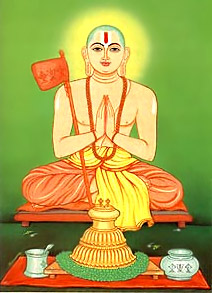 Philosophy developed during the Gupta Empire was pre-eminently evolved to achieve certain ends to the higher life, the life of the spirit. Philosophy of salvation or Moksha was highly emphasized. The philosophy was dynamic. The acts which make a man a slave are those which he does without perfect knowledge.
Philosophy developed during the Gupta Empire was pre-eminently evolved to achieve certain ends to the higher life, the life of the spirit. Philosophy of salvation or Moksha was highly emphasized. The philosophy was dynamic. The acts which make a man a slave are those which he does without perfect knowledge.
Purva Mimamsa Philosophy
Mimamsa means the reasoning which has to be adopted in order to understand the undertone of a word or sentence. The prefix purva is added as it deals primarily with the method of reasoning as far as rites which form the earlier portion of the Vedas are concerned. The subject matter of this system is the study of the Vedic rites. Purva Mimamsa discusses the nature of Vedic rites. The primary and secondary character of these rites, their priority in the matter of performance together with their results and purposes are also discussed. According to this philosophy rituals need to be performed for attaining salvation.
Vaiseshika Philosophy
The oldest of the philosophic sutras are the sutras of the Vaiseshika philosophy. This philosophy gives an atomistic doctrine. This philosophy seeks to provide a clear path for achieving salvation. This sutra considers the Vedas to be authored by those who have superior wisdom. God is the creator and controller of all things according to this philosophy. A desire arises in the mind of God for creating the world over again so that the beings experience the fruits of the actions of their past lives. When this desire appears in God, it sets in motion all the potential tendencies which operating upon the various atoms lead to formation of the world. According to this system when a man with required knowledge and intelligence performs good acts without selfish motives he is born in a pure family. Gradually the desire for salvation arises in him and he attains it by stages and there is no further body for him. This system gives correct mode in making judgments and gathering knowledge.
Nyaya Philosophy
The Vaiseshika philosophy was regarded as a complement of the Nyaya philosophy. Nyaya philosophy gives us an art of reasoning. A man who is capable of arguing avoids false knowledge, vice, action and pain. Therefore proper reasoning leads to salvation. Various modes of reasoning are given in this philosophy; for example, perception and inference, analogy and testimony. The system also gave a sort of syllogism. These philosophies of Vaiseshika and Nyaya are distinguished by their realism.
Vedanta Philosophy
Vedanta is also called the second mimamsa. Vedanta, meaning end of the Veda, is the most famous of Indian philosophies. Vedanta asserts the freedom of the self from the world. It denies the world calling it an illusion. It prescribes renunciation of the world in spirit which has to be achieved gradually and methodically as per the capacities of each individual. God is the only reality. Vedanta is more idealistic than realistic emphasizing knowledge rather than action and contemplation rather than rituals and ceremonies. Vedanta is also known as advaita or no dualistic which means that there is no double principle. In everything there is God. This philosophy is a monistic philosophy. This philosophy was modified later on by many that resulted in philosophical schools of Ramanuja, Madhva and Nimbarka. This philosophy has also been enumerated in the Upanishads also.
Yoga Philosophy
The Yoga philosophy has given us the most profound ideas of psychology and formulated methods of attaining salvation. There are eight stages of Yoga. With the help of these, mind is purified, enlightened and controlled. Things are understood on a true perspective. Union with god can be attempted by concentration and meditation.
Samkhya Philosophy
Samkhya and Yoga are regarded as complementary, one is theoretical and the other is practical. The philosophy of Samkhya is based upon dualism for instance, between Purusha and prakriti. There are further divisions namely those of ether, wind, fire, water, earth, sound, contact, taste, shape and scent. There are also evolved organs of knowledge and action like hearing, touch, sight, taste, smell, voice, feet, hands and the organs of generation and evacuation.
In the realm of philosophy India reached the highest watermark in the Gupta period. Thus if a man follows the knowledge provided by the philosophers then it would enslave him from the worldly affairs. India sought not merely deliverance but also sought to achieve liberty positively.



















